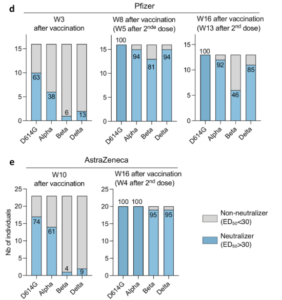The Vaccines still Protect Against the ‘Delta’ Variant
There exists a common misconception that vaccinations are ineffective against the Delta variant of COVID-19. This is untrue. A study conducted by the Pasteur Institute in France was conducted on a total of 170 patients infected with COVID-19, all with varying strains of the disease (alpha, beta, delta, and D614G), measuring data collected on them against 59 non-infected controls with the aim of investigating the sensitivity of the different strains against the neutralising antibodies (proteins used by our immune system to neutralise the coronavirus, stopping it from entering our cells) given by the Pfizer and AstraZeneca vaccines.

The data above compares the levels of neutralising antibodies in the test subjects after both one dose and two doses of both the Pfizer-BioNTech and Oxford-AstraZeneca vaccine. It illustrates that the ‘titers’ (the concentration of an antibody) were relatively low against all coronavirus variants after a single dose of either vaccine, particularly the Beta and Delta strains. However, the titers were at dramatically higher levels after the second dose for all COVID-19 variants. The Pfizer vaccine was seen to neutralise the delta variant in 13% of cases after the first dose. It was then measured again against two datasets and neutralised the delta variant in 94% of cases in the first set and in 85% of cases in the second. In the case of the AstraZeneca vaccine, the neutralisation titers against delta sat at 9% after the first dose and 95% after the second. This goes to show that whilst the vaccines are less effective against other strains of COVID-19 after the administration of one dose, this is no longer the case when individuals have received both doses.
Source: Planas et al., ‘Reduced sensitivity of SARS-CoV-2 variant Delta to antibody neutralization’ Nature (2021): https://doi.org/10.1038/s41586-021-03777-9.
Correspondingly, a study conducted by researchers from the University of Oxford researched the neutralising effect of the Oxford-AstraZeneca and Pfizer-BioNTech vaccines on the Kappa and Delta variants of COVID-19. 25 participants were tested 7-17 following their second dose of the Pfizer-BioNTech vaccine and another 25 were tested 14 or 28 days following their second dose of the Oxford-AstraZeneca.

The data above shows that there was a 2.5-fold reduction in the neutralising effect of the Pfizer-BioNTech vaccine and 4.3-fold reduction of the Oxford-AstraZeneca when compared to the scale of the vaccine’s effect on the Alpha and Gamma variants.
Whilst this study illustrates that there exists a lower level of neutralising antibodies against the delta variant from both vaccines when compared to their effect on strains such as Alpha, they also found ‘no evidence of widespread complete escape from neutralisation’.
Source: Liu et al. (2021) ‘Reduced neutralization of SARS-CoV-2 B.1.617 by vaccine and convalescent serum’ Cell: accessible at: https://doi.org/10.1016/j.cell.2021.06.020
Whilst the results on the neutralising effects of the vaccines on the Delta strain varied in these two studies, the fact that they still provide protection against the variant is evidenced in both. This proves that it remains imperative that people do not avoid getting vaccinated because they believe it will not be effective against the new strain.
